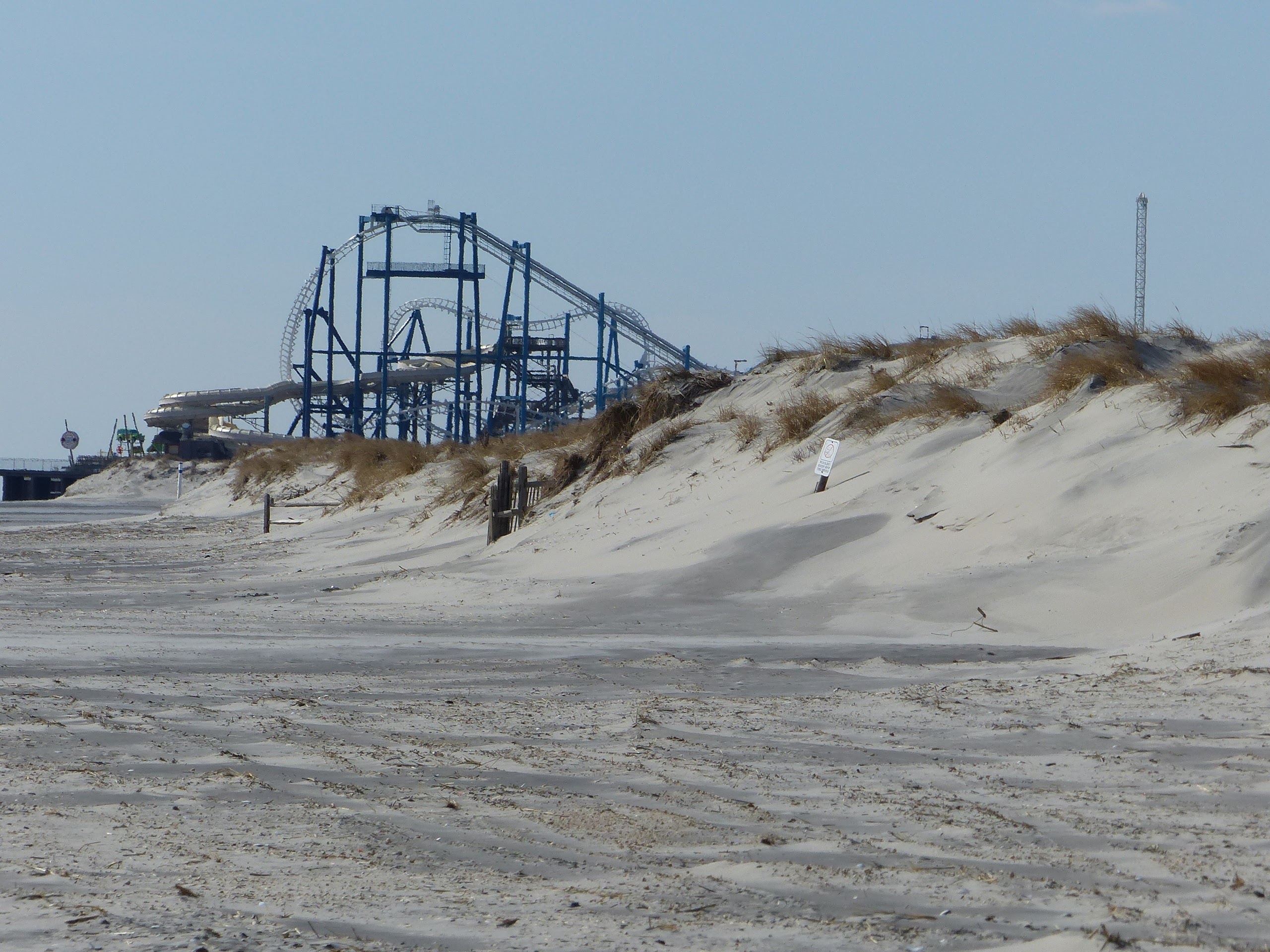WILDWOOD CREST – At a planning board meeting April 5, there was not much mahalo from the Wildwood Crest community for a proposed upscale motel project which would be named for the gracious Hawaiian expression.
For well over an hour, members of the public lined up for a turn at the microphone to speak on one of the most hotly contested planning applications in the borough’s history – ICONA Resorts Chairman Eustace Mita’s proposal to put an addition on the former Ocean Holiday motel and open it as Mahalo Resort.
The application, which seeks final site plan approval and 13 variances, was continued to June 7, with extensive testimony pushing the hearing over the board’s four-and-a-half hour time limit. Mahalo requested that the application not be called during the May meeting because their engineer would be unavailable.
Held in the borough’s municipal courtroom, the meeting had close to 75 members of the public, including many other local hotel and motel owners and several ICONA employees.
The crowd was standing room only and there wasn’t much room to stand. People spilled out into the hallway at Borough Hall, with many shoulder-to-shoulder for the duration of the proceeding. The Herald was the only media outlet in the room for the meeting.
Now, members of the Crest’s recently consolidated land use board will have two months to ponder Mita’s proposal and his request for 13 variances related to its development and weigh the project’s positive qualities with the public backlash.
Mahalo, the select-service offspring of his acclaimed full-service ICONA hotel chain, was supposed to open its first location on this site in Wildwood Crest, however litigation and permitting delays have forced it back in front of the board three years after it originally got local approval. The plan would be to operate Mahalo May-October, said Mita, who already debuted the concept in Diamond Beach with a second location coming to Cape May.
Frank Corrado, a lawyer for Mahalo, rested after presenting testimony from engineer Vincent Orlando, architect Steven Tomassetti and Mita.
Then came dozens of public comments, with some commenting positively about the developer, citing his integrity and insistence on quality service from his team members, but most saying he was asking for too much in trying to add a new adjoining tower.
The controversy surrounding the application mostly centers on the Mahalo’s desire to build out toward Rosemary Road with the new four-story tower of rooms, obstructing the view corridor toward the ocean, something which has been intentionally preserved in the town’s planning initiatives. Other concerned speakers focused on an undersized parking garage planned below the hotel and the ramifications it would have on street parking congestion and traffic safety.
The pool would be moved to the second floor to accommodate the ground level garage and the new tower would create an L shape of rooms surrounding the pool. The new rooms would obstruct the wide views to the ocean neighbors further from the beach can currently enjoy.
The prior version of the plan, approved by the Wildwood Crest Planning Board in March of 2020, actually asked for even more variance relief than the current application. Mahalo was forced to alter their plans to get a Coastal Area Facilities Review Act (CAFRA) permit, taking the requested setback off Rosemary Road from 0 feet to 11 feet. That CAFRA permit approval is now being appealed, Nicholas Talvacchia, an attorney for the Compass Family Resort, a neighboring motel, told the Herald.
The over-capacity crowd April 5 was a stark contrast with the turnout for the hearing in March 2020 when only one member of the public spoke.
Even though the Planning Board unanimously approved that prior application, this is considered a completely separate proposal because of the modifications and the former approval is not to factor into the board members’ decisions.
Mahalo’s Proposal
To begin the hearing, Corrado listed the favorable modifications his client made to the site plan that was approved in 2020.
The 13 variances Mahalo is asking for fall into three main categories: setbacks, parking and signage.
Beside the 11-foot improvement to the setback off Rosemary Road, the current application is for 66 rooms, when they had previously been seeking 70, therefore making the parking ratio a little closer to conforming.
Mahalo said that their undersized parking arrangement would be staffed by a 24/7 valet and that it improves safety because there would no longer be cars backing out onto Rosemary Road. In addition to relief to allow them 10 fewer spaces than required by ordinance, Mahalo is also seeking relief for undersized spaces and drive aisles, no off-street-loading zone, allowing tandem parking in handicap spaces and for a non-landscaped parking area.
The application also seeks approval for one extra sign, asking the board to allow them to have three total, which would be the word “Mahalo” backlit by a light on a dimmer. The signs would also be larger than what the ordinance allows.
Although an improvement from the 0-feet proposal the 2020 board approved, the 11-foot setback proposed along Rosemary Road still falls well short of the 30-feet required by ordinance and the new tower would have a 0-foot setback on Ocean Avenue, where 20 feet is required.
The rooms in the new tower are proposed to be over 500 square feet and the only undersized rooms in the new hotel would be the existing rooms from the old Ocean Holiday.
“Smear Campaign”
After testimony from the architect and engineer on the specifics of the proposal, Mita took the microphone and talked about the project’s rocky past.
He said he never imagined litigation and environmental permits would have frozen the property in time. The Ocean Holiday has sat on stilts dilapidated and gutted for three years, surrounded by chain-link fences, with the pool and sundeck demolished.
“The first thing I’d like to say to everybody on the board, and to everybody in this room, is that I am sorry. I am so, so sorry. This is not the way we do business,” Mita began, referencing the frozen jobsite. “I sincerely apologize. I had no idea that I would be where I am today.”
However, Mita’s tone quickly changed as he shifted focus to his frustration with a letter that he said was circulated before the meeting by email on Greater Wildwood Hotel and Motel Association letterhead, asking for people to turn out to oppose his proposal.
“Everybody here, we’re neighbors. We’re on the same team. That’s why I was a little bit shocked when I read what I saw this morning,” Mita said. “I think it’s only fair that, rather than judge, jury and be convicted, I can tell you a little bit about myself.”
Mita said his grandfather had a home in the Crest 75 years ago and Mita’s career as a hotelier began in the town with the Swan Motel, then continued with the Casa Nova Motel before he opened his first ICONA in 2013 at the former Pier 6600 Hotel in Diamond Beach.
Mita said that he was the subject of a “smear campaign” and the blast email was rife with misinformation.
“They’re supposed to be the lobby for all of us together, united together as hotel and motel owners. And then the opposite is true,” Mita testified, adding he is a member of the association. However, that claim was disputed during the public comment portion.
He said other local hotel and motel owners should welcome his proposal, because “a rising tide lifts all boats.”
“We don’t know how to do anything but to do it right and do it beautiful. That was our wish here,” he added.
He also said the decline in hotel rooms on the island and increasingly common condo-conversions is troubling.
“The lifeblood of tourism is hotel rooms,” he told the board. “We’re at an inflection point here where we actually need more hotel rooms.”
Objection!
The Compass Family Resort, Mahalo’s neighbor across Ocean Avenue, has been opposing the project and was represented during the hearing by their attorney, Talvacchia. Talvacchia sued Mahalo on behalf of the Compass after their initial application was approved.
Mita said he has never had an approved application appealed before, and has never had a CAFRA permit approval appealed, which Compass also did. He said since the project began, interest rates have gone from 3.5 to 8 percent.
“To me, it’s just a way to hold me up for four years,” Mita said of the Compass’ recently litigious tendencies.
The Compass is owned by the Pawlowski family, who all attended the meeting. Talvacchia told the board he planned to call two expert witnesses, a traffic engineer and a planner, to testify against the Mahalo application.
The Compass’s presentation was cut short due to the time restrictions but will continue at the June hearing.
George Pawlowski Sr., who bought the Compass Motel in 2001, did speak during public comment.
“Does Compass Motel want more litigation and lawsuits? No! The answer is no. We only want to operate as we have the last 22 years, as Compass Motel, with a view corridor like we had,” Pawlowski said.
He suggested the Compass might withdraw their litigation if the Mahalo eliminated the new tower of hotel rooms.
“As long as we eliminate the 11 additional units that Mahalo wants to build and as long as the setbacks are maintained and the property is self-contained, we have no objection. Anything more would be a big overreach by one developer trying to change the landscape from which everyone else has had to abide by,” Pawlowski told the board.
Pawlowski also said the Mahalo could avoid the business costs associated with eliminating 11 rooms from the plan by building up, something that is encouraged in the borough’s planning documents to stimulate reinvestment in the hotel and motel zone while maintaining view corridors.
However, experts for the Mahalo said that was impossible because of the structural integrity of the building.
“They can make a lot of excuses why they cannot build up,” Pawlowski said. “It’s your problem. Build up. Don’t take away my view corridor.”
If Mahalo is built as proposed, he said he will not guarantee the future of the Compass, suggesting it could be redeveloped as condos or townhouses.
Traffic engineer David Shropshire testified for the Compass that the combination of variances surrounding the parking arrangement Mahalo is seeking creates an untenable situation that cannot be fixed without reducing the number of spaces given there are already compromises made for the size of spaces and the size of circulation aisles.
Shropshire also questioned the legitimacy of multiple proposed spaces. He said there are multiple dead-end spaces where cars would be locked in and cars parked in them could only leave the garage by backing all the way out.
He testified he has never seen tandem handicap parking in his life, though he couldn’t find anything in the ADA guidelines expressly prohibiting it. He also testified there are potential problems with the overhead clearance related to ADA requirements.
“If I was to review this for the board, I would say you legitimately are going to lose seven spaces within that site,” Shropshire testified. “If you lose seven spaces, it goes back to the whole issue of do you have enough parking on the site. It’s already a variance. If you go down from 70 spaces, where 80 are required, losing another seven, that’s a 10 percent loss, down to 63. You don’t even have one-for-one at that point.”
Time ran out before testimony from the planner the Compass hired could be presented, as well as testimony from George Jr. and Paul Pawlowski.
Public Comment
Talvacchia, the Compass’ lawyer, said after the meeting public participation was very important, especially since the board was without the benefit of it when they approved the application in 2020.
“Part of the test for variance relief is negative impact to the public good,” Talvacchia told the Herald. “That’s part of the test they have to evaluate. They didn’t have that information three years ago.”
Melissa Roy, third-generation owner of the VIP Motel, kicked off the public comment session, saying that once the board allows development to obstruct view corridors on this street it would be unfair if they didn’t allow it elsewhere for other potential developers.
She said she was one of the ones responsible for writing the email sent from the Hotel and Motel Association and that Executive Director Tammy Davis, who signed it, did not compose it and was only doing as she was told.
“The absolute number one, main concern for myself is the view corridor. Our forefathers have protected that view corridor for years and there’s a reason for it. So, if this is allowed, it opens the door,” Roy said.
Gina Laky has worked at the motel her family built 50 years ago, the Armada by-the-Sea Motel, and said she agreed with Mita’s comments that a rising tide lifts all boats, but doesn’t think the additional tower is necessary to achieve that effect.
“It is true that bringing in a beautiful, first-class property will elevate the quality of our town, and that will be something that will add value to the entire community. I do believe that it is possible to create a first-class property on the existing floor plan of the Ocean Holiday,” Laky said. “Bringing in a first-class hotel will be good for the quality of our town, but also preventing the view from being blocked, that that would also be very good for our town. That is why our guests come, because they want to see the ocean.”
Jane Reynolds, a resident, said she wasn’t so convinced that the rising tide wouldn’t drown some of Mita’s smaller competitors.
“I had a home in Stowe, Vermont. Vail Resorts came in and bought Stowe Mountain Resorts, and you know what happened? It crushed the little people. They kept building and developing and changing their ordinances,” Reynolds told the board. “It crushed the little motels and hotels. It crushed them. Restaurants went out of business. Our taxes went up. The tide didn’t lift us; it killed us. The tide was brutal. We drowned.”
The only member of the public who spoke during the initial meeting in 2020, Niru Dhruva, returned and addressed the board again April 5. He said other hotel and motel owners, like himself, should embrace new investment and improvement.
“We don’t want to be like Wildwood. We have to be updating our properties and when people are doing it, we should support them rather than fighting with them. That is to the benefit of all of us,” he said.
Daniel Alicea, the principal of Madison Resorts, a company currently in the midst of a restoration of the Oceanview Motel in Wildwood Crest, spoke in support of Mita and the proposal.
“Change is tough. It’s really tough. I get it. But sometimes, change has to happen for the betterment of all,” Alicea said. “I worked for Mr. Mita. Amazing properties. No stone is left unturned. Unbelievable. I will also tell you this: it’s because of what ICONA has done, I believe, that has inspired people like me.”
Others testified to Mita’s character, including a handful of his employees, and to the excellent reputation of his other properties. However, the vast majority of those who came out were against the proposed 11-room addition.
Public comment was closed before the Compass began their presentation, so it is not expected public comments will be welcomed again when the application is continued June 7.
Until Next Time
The board will reconvene in May, but the Mahalo application will not be called. In June, the presentation will be first on the agenda and it is then a likely decision will be made about the future of the property.
Even if it passes then, construction may still be delayed while Compass’ appeal of the CAFRA permit issued by the Department of Environmental Protection is decided. First, it is under agency review and then could be litigated in the appellate division of Superior Court.
Compass could seek an injunction from a judge to prevent construction from beginning until the appeal is decided.
To reach Shay Roddy email sroddy@cmcherald.com or call (609) 886-8600 ext. 142.








